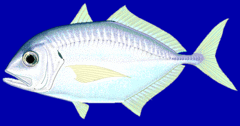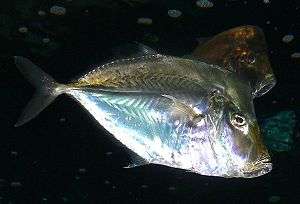Carangidae
| Carangidae | |
|---|---|
 | |
| Malabar trevally, Carangoides malabaricus | |
| Scientific classification | |
| Kingdom: | Animalia |
| Phylum: | Chordata |
| Class: | Actinopterygii |
| Order: | Perciformes |
| Family: | Carangidae Rafinesque, 1815 |
| Genera[1] | |
|
Alectis | |
Carangidae is a family of fish which includes the jacks, pompanos, jack mackerels, runners, and scads.
They are marine fishes found in the Atlantic, Indian and Pacific Oceans. Most species are fast-swimming predatory fishes that hunt in the waters above reefs and in the open sea; some dig in the sea floor for invertebrates.
The largest fish in the family, the greater amberjack, Seriola dumerili, grows up to 2 m in length; most fish in the family reach a maximum length of 25–100 cm.
The family contains many important commercial and game fish, notably the Pacific tunfisk, Trachurus symmetricus, and the other jack mackerels in the genus Trachurus.
Many genera have fairly extensive fossil records, particularly Caranx and Seriola, which extend into the early Paleogene (late Thanetian), and are known from whole and incomplete specimens, skeletal fragments, and otoliths. The several extinct genera include Archaeus, Pseudovomer, and Eastmanalepes.
Timeline of genera

 African pompano, Alectis ciliaris
African pompano, Alectis ciliaris Island trevally, Carangoides orthogrammus
Island trevally, Carangoides orthogrammus Giant trevally, Caranx ignobilis, the largest species in the genus
Giant trevally, Caranx ignobilis, the largest species in the genus Indian scad, Decapterus russelli
Indian scad, Decapterus russelli Golden trevally, Gnathanodon speciosus
Golden trevally, Gnathanodon speciosus Golden trevally
Golden trevally Pilotfish, Naucrates ductor
Pilotfish, Naucrates ductor Lookdown, Selene vomer
Lookdown, Selene vomer Greater amberjack, Seriola dumerili
Greater amberjack, Seriola dumerili Japanese jack mackerel, Trachurus japonicus
Japanese jack mackerel, Trachurus japonicus
References
- ↑ Froese, Rainer, and Daniel Pauly, eds. (2013). "Carangidae" in FishBase. February 2013 version.
| Wikimedia Commons has media related to Carangidae. |
| Wikispecies has information related to: Carangidae |